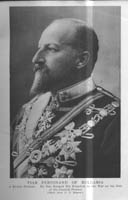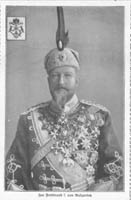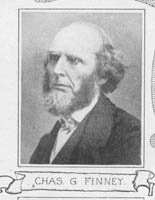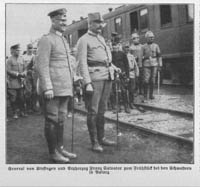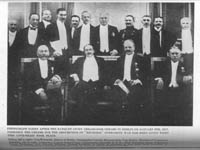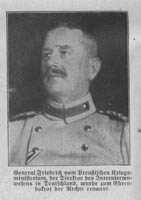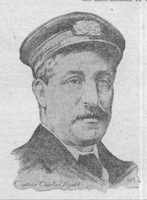Table of Contents
Key Figures
Statesmen
a | b | c | d-e | f | g | h-i | j-l | m | n-o | p | r | s | t-v | w-y
Tsar Ferdinand I of Bulgaria (1861-1948)
Born in Vienna, Ferdinand was a prince of Saxe-Coburg and became a biologist. He was elected to the throne of Bulgaria in 1887 as the successor to Prince Alexander. During the first part of his reign, Ferdinand had to address domestic problems and sought recognition from other powers (the Russians finally recognized his position in 1896). During the Bosnia Crisis of 1908, Ferdinand declared Bulgaria's independence from the Ottoman Empire and assumed the title of tsar. Ferdinand joined with the other Balkan states in the First Balkan War (1912-1913) against Turkey and Bulgaria gained territory in Macedonia and on the Aegean Sea. Bulgaria was badly defeated in the Second Balkan War (1913) by Turkey, Greece, Romania, and Serbia and lost territory to the Serbs and Romanians. In the First World War, Ferdinand joined the Central Powers in 1915 after the Allied debacle at Gallipoli and the Bulgarians gained territory from Serbia and Romania. In September 1918, the Allies launched a major offensive from Salonika and overwhelmed the Central Power defenses, forcing the Bulgarian government to sign an armistice. Ferdinand abdicated his throne to his son Boris and retired to Coburg in Germany.
Charles Grandison Finney (1792-1875)
An American clergyman and educator, Finney was ordained a minister in the Presbyterian Church in 1824. He began conducting evangelistic meetings and was a leading voice in the Second Great Awakening Movement in the United States. Finney became a professor at Oberlin College in 1834 and served as the president of the institution from 1851 to 1866. He supported the expansion of the YMCA across the United States.
Archduke Franz Salvator of Austria-Tuscany (1866-1939)
Franz Salvator was the younger brother of Archduke Leopold Salvator. He married Archduchess Maria Valeria of Austria, the youngest daughter of Kaiser Franz Josef, in July 1890, and they had ten children. Franz Salvator was a colonel in Hussar Regiment No. 15 which saw action on the Italian Front in the Tyrol during World War I. Archibald Harte enlisted Franz Salvator to serve as the Honorary President of the War Prisoners' Aid Committee in Austria-Hungary, which served as the supervisory organization of Association POW relief in the Dual Monarchy. The agency became an integral part of the Austrian and Hungarian Red Cross Societies in the Spring of 1916. Maria Valeria died in 1924 and Franz Salvator was married morganatically to Baroness Melanie Freiin von Riesenfels in April 1934. The archduke died in Vienna in April 1939.
General Friedrich
At the beginning of World War I, Colonel Friedrich was in charge of the Department of Prisoners of War in the German Ministry of War. As the war progressed, the German prison camp system expanded exponentially as the Germans eventually became responsible for the confinement and care of over 2.8 million Allied POW's. Friedrich represented the German government at prisoner of war conferences with the Allied Powers as both sides attempted to reach agreements regarding the treatment of prisoners and exchange programs. Friedrich worked closely with the YMCA and the War Prisoners' Aid program to provide welfare services to Allied POW's. By the end of the war, Friedrich attained the rank of major general.
Captain Charles Fryatt (d. 1916):
A British sea captain, Fryatt commanded the S.S. Brussels, a steamer that plied the English Channel between Rotterdam and the English east coast. In March 1915, Fryatt attempted to ram a German U-boot, which was preparing a torpedo run against his ship. The submarine implemented a crash dive and escaped, but Fryatt was hailed a British hero. A group of German torpedo boats intercepted S.S. Brussels off the Dutch coast in July 1916 and Fryatt received a court martial at Bruges. As a civilian, the court found Fryatt guilty as a franc-tireur for his attempt to sink a German warship and he received a sentence of capital punishment. The Kaiser confirmed the sentence and the Germans executed Fryatt on 27 July 1916, primarily as a warning to other merchant marine captains.
